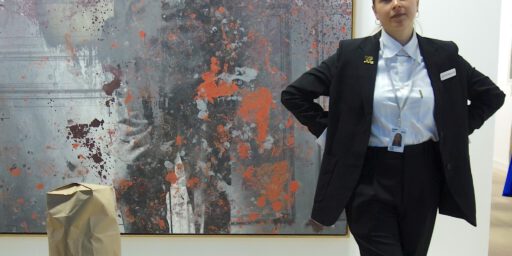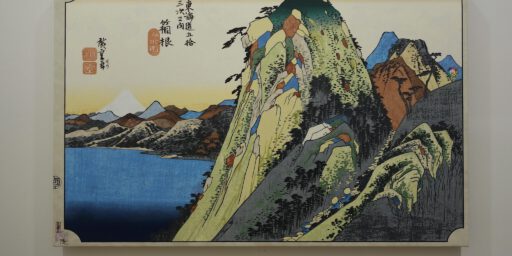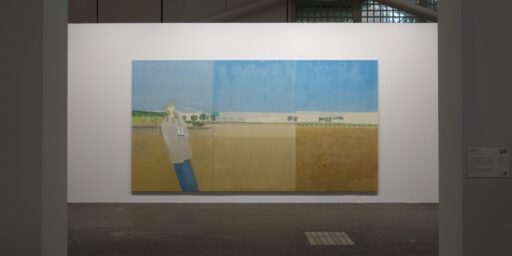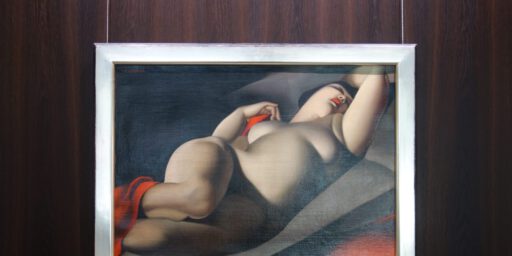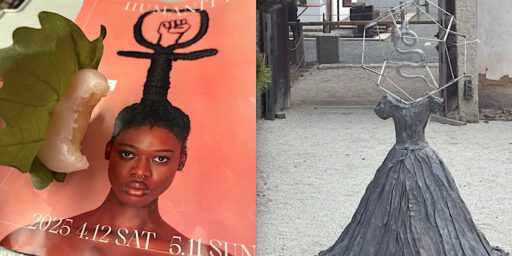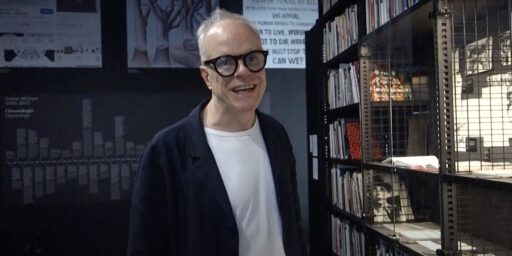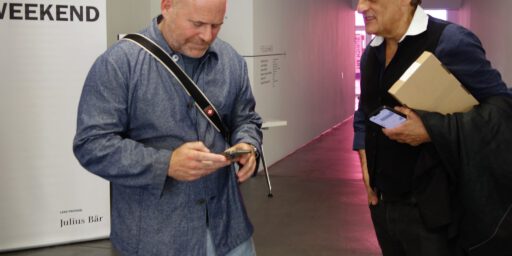日産自動車の西川廣人さんへ 日産アートアワードはどうなりますか? 今日のゴーン「私は無実です」 To NISSAN's Mr. SAIKAWA Hiroto: what will happen to the NISSAN ART AWARD? Ghosn today: "I am innocent"
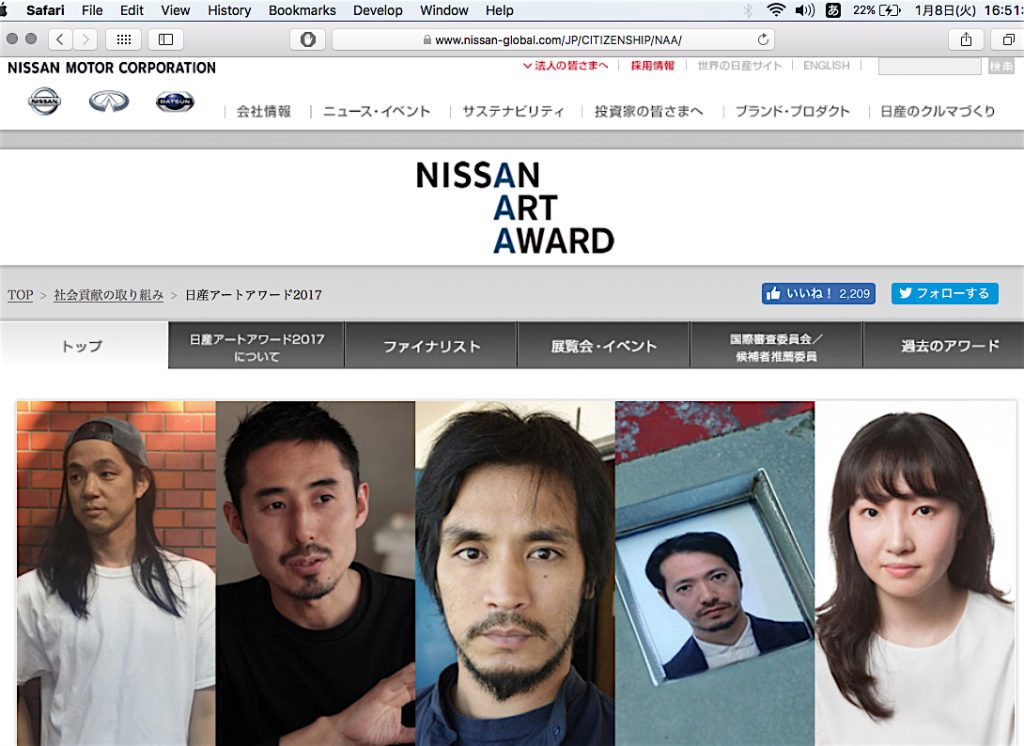
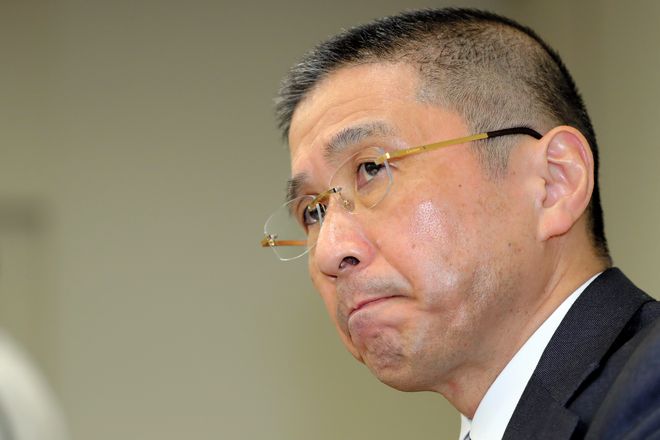
What will happen to the NISSAN ART AWARD, initiated by Carlos Ghosn? Will it be canceled?
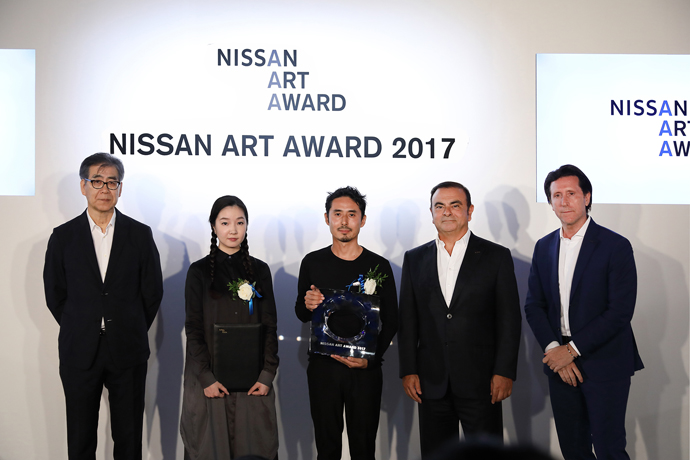
NISSAN ART AWARD 2017 Ceremony. From left: Mori Museum director NANJO Fumio, artist YOKOYAMA Nami (audience prize), FUJII Hikaru (NISSAN ART AWARD), NISSAN CEO Carlos Ghosn, NISSAN designer Alfonso Albaisa
quote by then NISSAN CEO Carlos Ghosn in 2017:
日産自動車の会長、カルロス ゴーン氏は「今年も日産アートアワードを通じて、日本人アーティストと文化コミュニティをサポートできることを誇りに思います。
日本の気鋭のアーティストたちが魅せてくれる才能や多様性からは、常にインスピレーションを受け続けてきました。
ヨコハマトリエンナーレが開催される今秋、彼らファイナリストの新作が世界に向けて披露されることが、心から楽しみでなりません。
本アワードを通して、今後も多くの方が日本の文化発展に興味を持つことを期待しています」と語った。
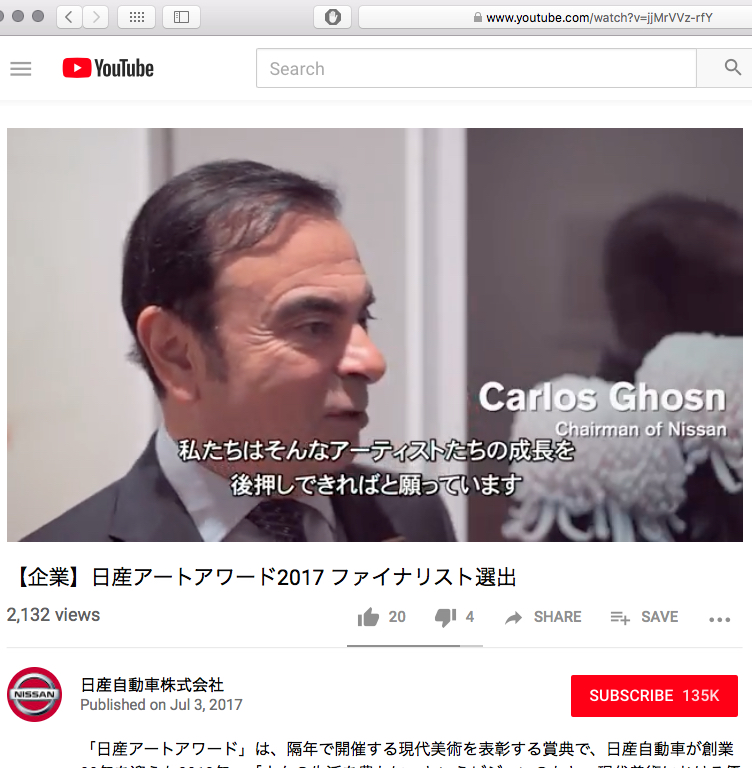
日産自動車株式会社
Published on Jul 3, 2017
「日産アートアワード」は、隔年で開催する現代美術を表彰する賞典で、日産自動車が創業80年を迎えた2013年、「人々の生活を豊かに」というビジョンのもと、現代美術における優れた日本人アーティストの活動を支援し、次世代へと続く日本の文化発展の助力になることを目指して発足しました。
この度、カルロス ゴーン同席のもと、ニューヨークにて行われた「日産アートアワード2017」第一次選考では、候補者推薦委員により選出された25名の現代アーティストの中から気鋭の5名がファイナリストとして選出されました。
ファイナリストは今後、9月にBankART Studio NYK(横浜)にて開催される展覧会へ向けて新作を制作し、9月27日(水)の最終選考でグランプリが決定されます。
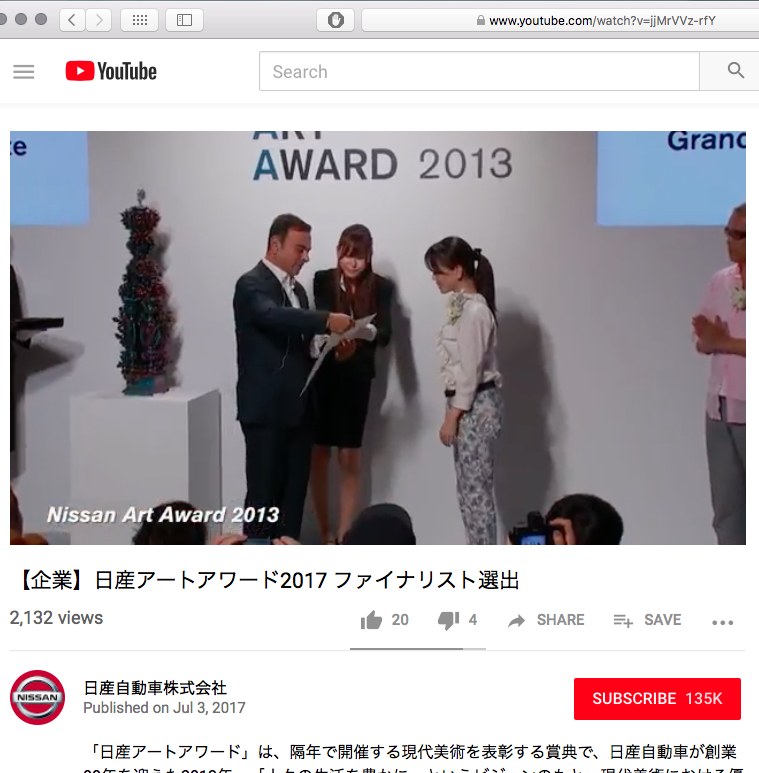
【企業】日産アートアワード2017 ファイナリスト選出
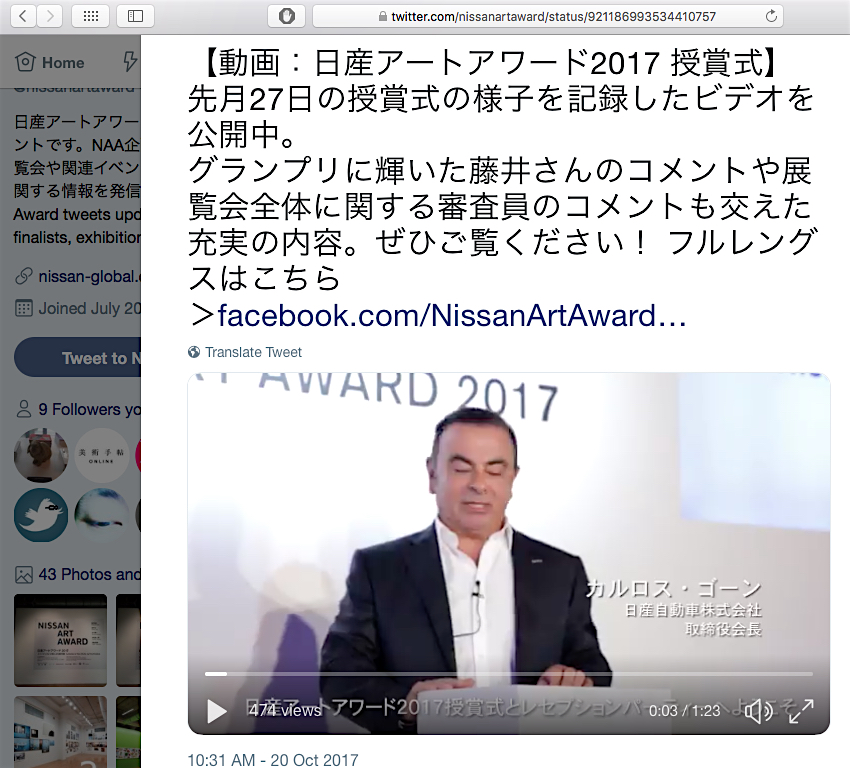
【動画:日産アートアワード2017 授賞式】
先月27日の授賞式の様子を記録したビデオを公開中。
グランプリに輝いた藤井さんのコメントや展覧会全体に関する審査員のコメントも交えた充実の内容。ぜひご覧ください! フルレングスはこちら
https://twitter.com/nissanartaward/status/921186993534410757
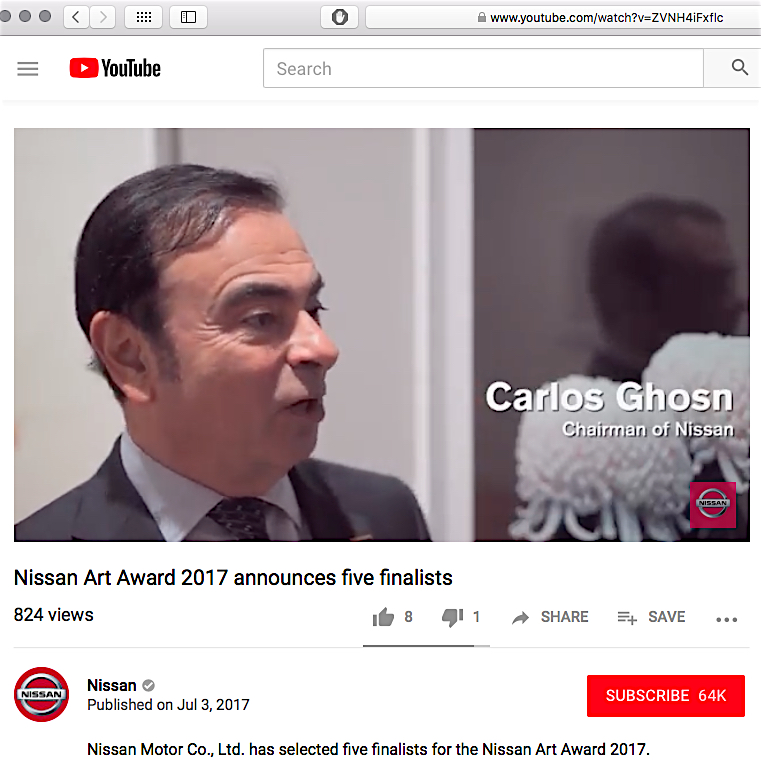
Nissan Motor Co., Ltd. has selected five finalists for the Nissan Art Award 2017.
The five emerging contemporary Japanese artists were among 25 candidates nominated during the first selection round in New York in May, with Nissan Chairman Carlos Ghosn in attendance.
The finalists will be creating new artwork for an exhibition taking place this autumn in parallel with the Yokohama Triennale in Japan.
The Grand Prix winner of the Nissan Art Award 2017 will receive the opportunity to participate in an artist residency at the International Studio & Curatorial Program (ISCP) in New York.
The winner will be announced on Sept. 27.
Nissan Art Award 2017 announces five finalists
Carlos Ghosn, who has spent the last 51 days detained in a Japanese jail, could finally make a public statement in his first court appearance.
For the record, because history is going to be made, I am posting the original statement by Carlos Ghosn.
The presumption of innocence 推定無罪 must be observed in criminal matters!
The presumption of innocence must be a central principle, a fundamental rule to the present-day law system in Japan.
In dubio pro reo! 疑わしきは罰せず!
I am personally very annoyed by the whole matter (especially about the coverage by the Japanese media), which is, nationally and internationally viewed, a disgusting scandal.
Fact is, NISSAN’s parent Renault has so far maintained Ghosn in office as chairman and CEO, citing the presumption of innocence 推定無罪.
It’s also a scandal, that Mr. Saikawa has not fully disclosed to its parent company Renault all the facts and the reason why it dismissed Mr. Ghosn.
Thierry Bollore, deputy CEO of Renault, the company which owns 43% of NISSAN’s stocks, had written to NISSAN chief executive Hiroto Saikawa to request a shareholder meeting as soon as possible.
However, NISSAN has rejected Renault’s request for a shareholder meeting!
Which is an outrageous scandal, too.
Regarding the NISSAN ART AWARD and the history of Ghosn’s arrest, see the attached links:
https://www.nissan-global.com/JP/CITIZENSHIP/NAA/
世界の三番目、大金持ちの経済大国のニッポン。
World’s No.3, extremely rich, economic super-power Nippon.
https://art-culture.world/articles/extremely-rich-economic-super-power-nippon/
Tokyo, HEISEI 31, January 8th
Mario A
January 7, 2019
Statement of Carlos Ghosn
Your Honor,
I am grateful to finally have the opportunity to speak publicly. I look forward to beginning the process of defending myself against the accusations that have been made against me.
First, let me say that I have a genuine love and appreciation for Nissan. I believe strongly that in all of my efforts on behalf of the company, I have acted honorably, legally, and with the knowledge and approval of the appropriate executives inside the company—with the sole purpose of supporting and strengthening Nissan, and helping to restore its place as one of Japan’s finest and most respected companies.
Now I would like to address the allegations.
1. The FX Forward contracts
When I first joined Nissan and moved to Japan almost 20 years ago, I wanted to be paid in U.S. dollars, but was told that that was not possible and was given an employment contract that required me to be paid in Japanese yen. I have long been concerned about the volatility of the yen relative to the U.S. dollar. I am a U.S. dollar-based individual—my children live in the U.S. and I have strong ties to Lebanon, whose currency has a fixed exchange rate against the U.S. dollar. I wanted predictability in my income in order to help me take care of my family.
To deal with this issue, I entered into foreign exchange contracts throughout my tenure at Nissan, beginning in 2002. Two such contracts are at issue in this proceeding. One was signed in 2006, when the Nissan stock price was around 1500 yen and the yen/dollar rate was around 118. The other was signed in 2007, when the Nissan stock price was around 1400 yen and the yen/dollar exchange rate was around 114.
The 2008–2009 financial crisis caused Nissan’s shares to plummet to 400 yen in October 2008 and to 250 yen in February 2009 (down more than 80% from its peak) and the yen/dollar exchange rate dropped below 80. It was a perfect storm that no one predicted. The entire banking system was frozen, and the bank asked for an immediate increase in my collateral on the contracts, which I could not satisfy on my own.
I was faced with two stark choices:
1. Resign from Nissan, so that I could receive my retirement allowance, which I could then use to provide the necessary collateral. But my moral commitment to Nissan would not allow me to step down during that crucial time; a captain doesn’t jump ship in the middle of a storm.
2. Ask Nissan to temporarily take on the collateral, so long as it came to no cost to the company, while I gathered collateral from my other sources.
I chose option 2. The FX contracts were then transferred back to me without Nissan incurring any loss.
2. Khaled Juffali
Khaled Juffali has been a long-time supporter and partner of Nissan. During a very difficult period, Khaled Juffali Company helped Nissan solicit financing and helped Nissan solve a complicated problem involving a local distributor—indeed, Juffali helped Nissan restructure struggling distributors throughout the Gulf region, enablingNissan to better compete with rivals like Toyota, which was outperforming Nissan. Juffali also assisted Nissan in negotiating the development of a manufacturing plant in Saudi Arabia, organizing high-level meetings with Saudi officials.
Khaled Juffali Company was appropriately compensated—an amount disclosed to and approved by the appropriate officers at Nissan—in exchange for these critical services that substantially benefited Nissan.
3. The FIEL Allegations
Four major companies sought to recruit me while I was CEO of Nissan, including Ford (by Bill Ford) and General Motors (by Steve Rattner, the then-Car Czar under President Barack Obama). Even though their proposals were very attractive, I could not in good conscience abandon Nissan while we were in the midst of our turnaround. Nissan is an iconic Japanese company that I care about deeply. Although I chose not to pursue the other opportunities, I did keep a record of the market compensation for my role, which those companies offered me if I had taken these jobs. This was an internal benchmark that I kept for my own future reference—it had no legal effect; it was never shared with the directors; and it never represented any kind of binding commitment. In fact, the various proposals for non-compete and advisory services post-retirement made by some members of the board did not reflect or reference my internal calculations, underscoring their hypothetical, non-binding nature.
Contrary to the accusations made by the prosecutors, I never received any compensation from Nissan that was not disclosed, nor did I ever enter into any binding contract with Nissan to be paid a fixed amount that was not disclosed. Moreover, I understood that any draft proposals for post-retirement compensation were reviewed by internal and external lawyers, showing I had no intent to violate the law. For me, the test is the “death test”: if I died today, could my heirs require Nissan to pay anything other than my retirement allowance? The answer is an unequivocal “No.”
4. Contribution to Nissan
I have dedicated two decades of my life to reviving Nissan and building the Alliance. I worked toward these goals day and night, on the earth and in the air, standing shoulder to shoulder with hardworking Nissan employees around the globe, to create value. The fruits of our labors have been extraordinary. We transformed Nissan, moving it from a position of a debt of 2 trillion yen in 1999 to cash of 1.8 trillion yen at the end of 2006, from 2.5 million cars sold in 1999 at a significant loss to 5.8 million cars sold profitably in 2016. Nissan’s asset base tripled during the period. We saw the revival of icons like the Fairlady Z and Nissan G-TR; Nissan’s industrial entry into Wuhon, China, St. Petersburg, Russia, Chennai, India, and Resende, Brazil; the pioneering of a mass market for electric cars with the Leaf; the jumpstarting of autonomous cars; the introduction of Mitsubishi Motors to the Alliance; and the Alliance becoming the number one auto group in the world in 2017, producing more than 10 million cars annually. We created, directly and indirectly, countless jobs in Japan and reestablished Nissan as a pillar of the Japanese economy.
These accomplishments—secured alongside the peerless team of Nissan employees worldwide—are the greatest joy of my life, next to my family.
5. Conclusion
Your Honor, I am an innocent of the accusations made against me. I have always acted with integrity and have never been accused of any wrongdoing in my several-decade professional career. I have been wrongly accused and unfairly detained based on meritless and unsubstantiated accusations.
Thank you, your Honor, for listening to me.
https://www.pscp.tv/w/1YqGorVyeAbKv
LIVE: Lawyers of ex-Nissan chairman Carlos Ghosn hold news conference after a hearing in Tokyo District Court
up-date 2019/1/15:
NIKKEI Newspaper 日経新聞 2019年1月14日
Nissan-Renault alliance sinks deeper into disarray without Ghosn
Overconcentration of power threatens two decades of international cooperation
January 14, 2019 13:00 JST
TOKYO — The alliance between Nissan Motor and Renault, once touted as a rare successful international business tie-up, has slipped further into confusion since Carlos Ghosn was arrested nearly two months ago.
quote:
Ghosn reportedly formed a “private team” of major American bankers and others to quietly work out an integration scenario. At a Nissan board meeting last September, he said only that he would like to advance the alliance.
But a veteran Japanese executive feared that Ghosn would advance his plan for management integration on his next visit to Japan, warning that Nissan would be absorbed by Renault unless it took countermeasures.
Suspicions grew stronger last spring of Ghosn having designs on Nissan. A top-secret team set up by Nissan began working to topple him in cooperation with the special investigation squad of the Tokyo District Public Prosecutor’s Office. On Nov. 19, prosecutors arrested Ghosn upon his arrival at Tokyo’s Haneda Airport.
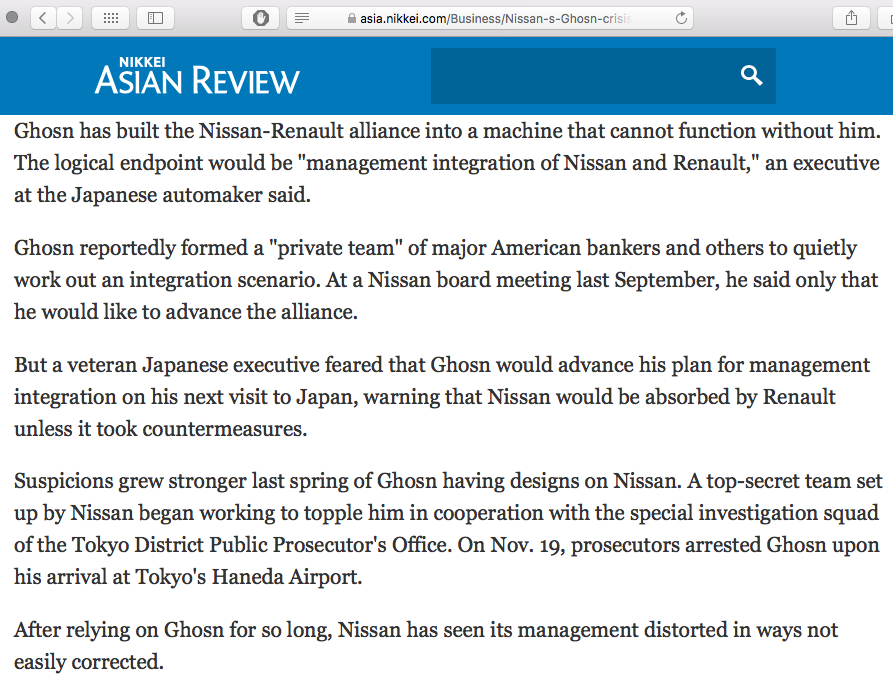
「クーデター説、ばかげている」日産社長が一蹴
2019年1月15日 10時7分 読売新聞
【ロンドン=戸田雄】仏経済紙レゼコー(電子版)は14日、日産自動車の西川
広人社長兼最高経営責任者(CEO)のインタビューを報じた。
西川氏は、日産の社内調査を共有すれば、ルノーもカルロス・ゴーン被告を解任するとの見解を示した。
カルロス・ゴーン被告の処遇を巡っては、日産と三菱自動車は会長職を解任したのに対し、ルノーは会長兼CEOにとどめており、判断が分かれている。西川氏は、「推定無罪の原則は尊重している」とする一方で、「ルノーの取締役が事件の書類のすべてに目を通すことを希望している。もしそうできたなら、我々と同じ(解任という)結論に至るだろう」と述べた。
海外メディアの一部では、ゴーン被告の逮捕が西川氏の「クーデター」だという見方が報じられたが、西川氏は「ばかげている」と一蹴した。
http://news.livedoor.com/article/detail/15873609/
up-date:
Ex-Nissan chairman Ghosn asks for bail, promises not to flee
THE ASSOCIATED PRESS
January 21, 2019 at 08:50 JST
Former Nissan chairman Carlos Ghosn on Monday asked for his release on bail from a two-month detention in Japan, promising he will report to prosecutors daily and wear an electronic monitoring ankle bracelet.
“As the court considers my bail application, I want to emphasize that I will reside in Japan and respect any and all bail conditions the court concludes are warranted,” he said in a statement shared with The Associated Press through a representative of Ghosn and his family.
“I am not guilty of the charges against me and I look forward to defending my reputation in the courtroom; nothing is more important to me or to my family,” he said.
Ghosn, 64, and in custody since his Nov. 19 arrest, is due for a bail hearing Monday after his bail request was denied by a Tokyo court last week.
His latest request includes a lease for a Tokyo apartment, where he promises to live. The offer to wear a monitoring device is not standard for Japanese bail but is often included in U.S. bail conditions. No trial date has been set.
In Japan, suspects are often kept in detention until trials start, especially those who assert innocence, in what’s criticized as “hostage justice.” Tokyo prosecutors say Ghosn is a flight risk and may tamper with evidence. Legal experts, including Ghosn’s lawyers, say preparations for trials as complex as Ghosn’s take six months or longer.
Ghosn is also promising to give up his passport and hire security guards acceptable to prosecutors that he would pay for.
He has been charged with falsifying financial reports in underreporting his compensation from Nissan Motor Co., and breach of trust in having Nissan shoulder investment losses and pay a Saudi businessman.
Ghosn has asserted his innocence, saying the compensation was never decided, Nissan never suffered losses and the payments were for legitimate services for Nissan’s business in the Gulf.
He has been held in austere conditions at the Tokyo Detention Center, allowed visits only by embassy officials, lawyers and prosecutors. His wife, Carole Ghosn, has expressed worries about his health and appealed to Human Rights Watch about what she saw as his unfair and harsh treatment.
Ghosn led Nissan for two decades, turning it around from near-bankruptcy to one of the world’s biggest and most successful auto groups. A Brazilian-born Frenchman of Lebanese ancestry, with work experience in the U.S., Ghosn was admired internationally for his managerial skills. He was sent in 1999 by Renault SA of France, which owns 43 percent of Nissan.
Nissan Chief Executive Hiroto Saikawa has denounced Ghosn, accusing him of using company money and assets for personal gain. But Nissan’s oversight has raised serious questions about governance at the automaker behind the Leaf electric car and Infiniti luxury models.
Nissan’s internal investigation found Nissan purchased homes and furnishings for Ghosn in Lebanon and Brazil, but only a handful of people at Nissan knew, according to people familiar with the probe. Nissan still owns the homes.
The latest development in the investigation was discussed by the board of Nissan’s Japanese alliance partner Mitsubishi Motors Corp. last week, centering on millions of dollars of salary and bonus pay to Ghosn by the automakers’ joint venture in Amsterdam last year, which neither Mitsubishi nor Nissan knew about.
No charges have been filed on these payments, which are separate from the compensation from Nissan cited in the charges already filed.
Ghosn’s compensation was long a sticking point in Japan, where the income difference between executives and workers is so minimal that company presidents are also called “salarymen.” Ghosn has said he deserved pay comparable to other star leaders of global companies.
Ghosn defended his record at Nissan at a Tokyo court earlier this month.
“I have a genuine love and appreciation for Nissan. I believe strongly that in all of my efforts on behalf of the company, I have acted honorably, legally, and with the knowledge and approval of the appropriate executives inside the company,” he said.
http://www.asahi.com/ajw/articles/AJ201901210019.html
up-date:
Ghosn Jail Time Is `Too Long, Too Hard,’ Macron Tells Japan
Gregory Viscusi, Bloomberg, 2019/1/27
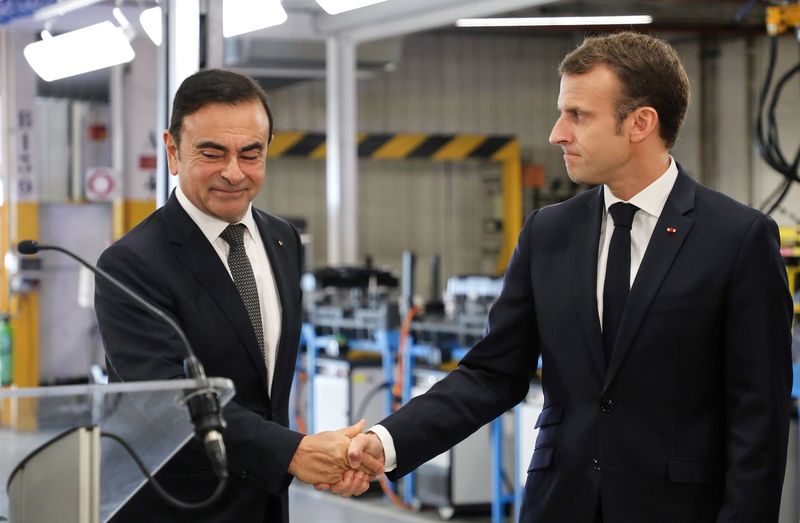
French President Emmanuel Macron told Japanese Prime Minister Shinzo Abe that he’s worried about Carlos Ghosn’s conditions in jail, making his strongest comments yet on the fallen car titan and the scandal that has rocked Renault SA’s decades-old alliance with Nissan Motor Co.
“All I’ll say is that I felt the detention was too long and too hard, and I told Abe that,” Macron told reporters in Cairo, referring to a telephone conversation with Abe on Friday. “I’m just concerned that the case of a French citizen should respect basic decency.”
Macron’s views follow days after Ghosn stepped down as chairman and chief executive officer of France’s largest carmaker and two months after Nissan booted him out, with the attention shifting to the future of the partnership. While Renault named Michelin CEO Jean-Dominique Senard as its chairman last week, the French leader has reportedly suggested the executive be made Nissan’s chairman as well to help manage the alliance.
With his public remarks on the case, Macron risks being seen as meddling in Japan’s justice system. Japan’s Chief Cabinet Secretary Yoshihide Suga told reporters Monday that due process is being followed in Ghosn’s detention and investigation.
“It is being carried out by highly independent investigative authorities, based on appropriate procedures and strict legal judgment, including the orders of the court,” Suga said. He also said the two carmakers should decide on who becomes Nissan’s chairman, pushing back on the idea of governments getting involved in the talks.
Ghosn has been in custody since his Nov. 19 arrest in Tokyo, indicted for allegedly understating his income at Nissan and transferring personal trading losses to the carmaker. He’s been denied bail repeatedly after prosecutors argued he’s a flight risk, while his lawyers say he could stay in custody until a trial that may be six months away. Ghosn has denied wrongdoing.
Macron’s involvement in the affairs of the two companies is mainly because of the power the French state wields over Renault. The government owns 15 percent of Renault with extra voting rights, while the latter holds about 43 percent of Nissan with voting rights, giving French leaders indirect say in decisions that sometimes affect the Japanese carmaker.
Nissan has a 15 percent non-voting stake in Renault, which also appointed Thierry Bollore as its CEO.
While both companies have repeatedly said they are committed to the partnership, Nissan has long been unhappy about what it considers an out-sized French role in the alliance, whose third member is Mitsubishi Motors Corp.
“We will be diligent to ensure the stability of the group,” Macron said.
Renault-Nissan alliance executives will meet this week in Amsterdam, where the company that manages the partnership is based, people familiar with the matter said. The meeting would be the first since Ghosn quit.
In an unexpected twist, Nissan CEO Hiroto Saikawa, a former protege of Ghosn who led the campaign against his ex-boss, said he too intends to step down in coming months after reforming the poor governance he says weakened the Japanese carmaker. Nissan has also been indicted by prosecutors.
Macron also has a history with Renault. On Sunday, he defended an increase in the French stake in 2015 on his watch as economy minister. It was a move that had rattled Nissan.
“I was happy I intervened, because I felt that Ghosn had gone too far in the ‘Nipponization’ of the group,” he said.
https://www.bloomberg.com/news/articles/2019-01-27/macron-tells-abe-he-is-worried-about-ghosn-s-time-in-prison
From the Japan Times archive:
Nissan award echoes a maturing art world
BY CAMERON ALLAN MCKEAN
STAFF WRITER, Japan Times, Jun 16, 2015
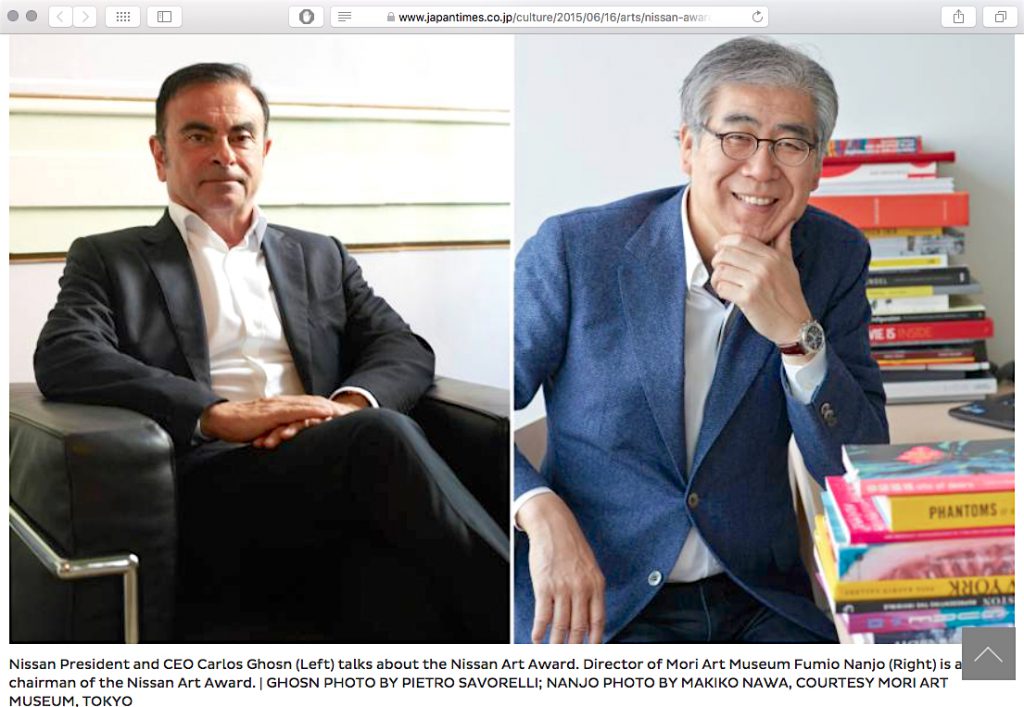
quotes:
…
Unlike many of the other deep-pocketed corporate arts-funding bodies in Japan — which typically make safe investments by awarding established artists — Ghosn says Nissan is awarding only “the next generation of Japanese talent. That’s it.”
But it’s not just about handing over “a cheque” says Ghosn.
“We show the work; we are embracing the artist,” he says. “We offer them space and support their fame and let the public know them — I think it’s a start.”
Rather than pooling resources into a single grand prize, Nissan offers ¥1 million to all finalists and provides a further ¥1 million for each of them to produce an artwork that will be exhibited in Yokohama’s BankART Studio NYK. From these works, a Grand Prix winner is awarded a further ¥2 million and a trophy.
“You have a lot of names, and many unknown or little-known talents (in Japan),” Ghosn says. “We want to support these artists being known in Japan and also certainly more known outside Japan, too. … We concentrate on contemporary art because this is where we can make the biggest difference.”
Fumio Nanjo, director of Tokyo’s Mori Art Museum and chairman of the Nissan Art Award, feels the award fills an arts-funding hole.
“Compared to the U.S. there are still very few companies who support contemporary art events in Japan,” he says. “The importance of supporting culture is something that needs to be understood by Japanese corporations.”
…
“It is not easy to summarize. There is no one trend,” Nanjo says. He views this complexity as evidence of contemporary art in Japan “maturing.”
To ensure the award captures the current state of art in Japan, Nissan appointed Nanjo and four other directors of leading art institutions from around the world as jury members. This team is also supported by 10 committee members who select and search for the “little-knowns.” Collectively, they form a respected group of curators and directors.
Although the Nissan Art Award stands out in a confusing milieu — a mature corporate award for Japan’s “maturing” art world — it is still a PR tool.
Describing the relationship between art and business as “it’s complicated” is a understatement. Even my trip here has been assisted by Nissan.
…
Cameron Allan McKean attended the 56th Venice Biennale with assistance from Nissan Motor Co., Ltd.
…
more at:
https://www.japantimes.co.jp/culture/2015/06/16/arts/nissan-award-echoes-maturing-art-world/
2019/1/31 up-date:
Exclusive interview: Ghosn says ‘plot and treason’ led to arrest
Ex-Nissan chief claims rivals wanted to ‘get rid’ of him
Nikkei staff writers, JANUARY 30, 2019
TOKYO — Former Nissan Motor Chairman Carlos Ghosn told Nikkei in an exclusive interview Wednesday that he had “no doubt” that the charges against him were the result of “plot and treason” by Nissan executives opposed to his plan for deeper integration between Renault and its two Japanese alliance partners.
Speaking on the 10th floor of the Tokyo Detention House, dressed in a black fleece jacket and gray sweatpants, Ghosn acknowledged that “there was a plan to integrate” Renault, Nissan and Mitsubishi Motors. The plans had been discussed with Nissan President Hiroto Saikawa in September, he added.
In his first interview since being detained on Nov. 19, Ghosn claimed that he had wanted to include Mitsubishi Motors CEO Osamu Masuko in the talks, but “Saikawa wanted it one-on-one.”
Once the three automakers were more closely integrated, Ghosn wanted to ensure there would be “autonomy under one holding company,” he said, adding that this plan was in line with how he had operated the alliance in past years.
Allies of Ghosn’s have argued that some Nissan executives feared a further concentration of power under his leadership, prompting them to cooperate with Tokyo prosecutors.
Nikkei had been requesting a one-on-one interview with Ghosn since his arrest last year. The approval was granted this week.
Ghosn was allowed by the Tokyo District Court to speak with Nikkei. Media interviews with prominent business leaders in detention are extremely rare in Japan.
“We don’t have much time. Let’s get started,” Ghosn said at the beginning of the interview from behind the acrylic glass partition. As the end of the allotted 15 minutes approached, he asked the officer for “a little more” time, and was granted a five-minute extension.
The Brazilian-born tycoon has dismissed accusations that his 19-year reign at Nissan was a “dictatorship,” saying this was a narrative created by rivals who wanted to remove him. “People translated strong leadership to dictator, to distort reality” for the “purpose of getting rid of me,” he added.
Ghosn has been held without bail for more than 70 days since Tokyo prosecutors arrested him on allegations of financial misconduct.
He was charged with underreporting his salary over several years, and aggravated breach of trust for allegedly transferring to Nissan personal trading losses from foreign exchange contracts.
The breach-of-trust charges center on $14.7 million in payments to a company run by Saudi businessman Khaled al-Juffali.
He denied the accusations and claimed “the executive in charge of the region signed [the approval].”
The payment was made from Ghosn’s “CEO reserve,” a pot of money that he was free to decide how to spend. He said the “CEO reserve is not a black box” and “four officers signed” for the payment to al-Juffali.
Ghosn is also accused of receiving 7.82 million euros ($8.9 million) in improper payments through Nissan-Mitsubishi B.V., a Netherlands-based joint venture between the two Japanese companies. He said the venture was established for “synergy and not for payment,” adding that the claims of improper payments were a “distortion of reality.”
Ghosn said his purchase of luxury properties in Rio de Janeiro and Beirut — which Nissan alleges were paid for improperly through a subsidiary — were approved by the legal department. Pointing to a former loyalist and long-time executive in the legal department, Ghosn said: “Hari Nada has done all this.”
He justified the houses on the grounds that he “needed a safe place where [he] can work and receive people in both Brazil and Lebanon.”
“[Have I] done [something] inappropriate? I am not a lawyer, I don’t know the interpretation of [such] facts,” Ghosn said, showing his frustration over Nissan’s internal investigation.
“These are known by everybody, why didn’t they tell me?”
Ghosn, whose second bail request was rejected Jan. 22, insisted that he was not a flight risk and he would not destroy evidence.
“I won’t flee, I will defend [myself],” he added. “All the evidence is with Nissan, and Nissan forbids all employees to talk to me.”
When asked about life in the detention center, Ghosn said “there is up and down.” As for his health, he simply said he was “doing fine.”
After his arrest, Ghosn appeared to have envisioned attending a Renault board meeting in Paris, explaining his position, and holding a news conference. But his prolonged detention in a Tokyo jail frustrated those plans.
Nissan dismissed Ghosn from his position as chairman in November. An extraordinary general meeting of shareholders scheduled in mid-April is expected to remove Ghosn as a director.
Ghosn resigned as chairman and CEO of Renault, and former Michelin chief Jean-Dominique Senard was appointed as the chairman.
The three members of the alliance are expected to revisit how it is operated in the absence of Ghosn’s leadership. “I cannot speculate about the future of the alliance,” Ghosn said.
The French government, Renault’s largest shareholder, has previously requested Ghosn make the relationship between the two automakers “irreversible.”
Following Ghosn’s arrest, France also informed Tokyo of an intention to press ahead with integration. Saikawa, in contrast, has insisted there is “no need for now to discuss [it].”
Interviewed by Nikkei commentator Atsushi Nakayama and Nikkei staff writers Akito Tanaka and Yosuke Kurabe.
https://asia.nikkei.com/Business/Nissan-s-Ghosn-crisis/Exclusive-interview-Ghosn-says-plot-and-treason-led-to-arrest
up-date 2019/2/13:
Nissan takes $83m charge related to Carlos Ghosn
BBC News, 2019/2/12
quote:
…Hiroto Saikawa looks every inch the corporate functionary. But he’s now widely seen as a ruthless corporate assassin, who seized on the allegations of wrongdoing against Carlos Ghosn to oust his former boss.
https://www.bbc.com/news/business-47207207
up-date 2019/2/15
What if Carlos Ghosn Were Charged in the U.S.?
By PETER J. HENNING/ © 2019 The New York Times
February 14, 2019 at 12:43 JST
quotes:
What charges could he face?
Japanese prosecutors have accused Ghosn of an abuse of corporate trust, a crime that does not exist in federal law in the United States. He is also charged with underreporting $80 million in income and temporarily transferring a personal debt to Nissan.
Prosecutors in the United States often use mail and wire fraud laws to accuse individuals of deception when they make personal gains. But there is a question of whether Ghosn actually misled Nissan, Mitsubishi or Renault, the three companies for which he served as chairman. In an interview with The Nikkei Asian Review, he maintained his innocence and accused senior executives at Nissan of an exercise in “plot and treason” carried out to have him removed from his position at the company.
The Securities and Exchange Commission has requested information from Nissan and Ghosn about any financial improprieties and possible misstatements in their financial reports. If there were to be a case filed against either party in the United States, it is much more likely to be a civil action, rather than a criminal prosecution, for violating the accounting requirements for companies whose shares are publicly traded. (Although violation of the federal securities laws can be charged as a crime, the Justice Department usually leaves accounting and corporate governance issues of the type involving Ghosn to civil regulators because proving the required intent can be difficult.)
Ghosn could also be accused of a crime in the United States for any underreporting of taxes owed on his pay, if he sought to avoid paying them on corporate benefits.
Under tax laws, attempts to evade or defeat a tax or make false statement on any document filed with the IRS can result in criminal charges. Those crimes require showing that a defendant knew about the tax reporting law and purposefully defied it, so most cases involving a failure to pay the requisite taxes are handled through a civil audit in which the overdue taxes and a penalty are assessed. Criminal charges for this type of violation are uncommon when there is no evidence of active hiding of funds, such as creation of a secret offshore account.
How would he be questioned?
The Japanese Constitution states that “no person shall be compelled to testify against himself” and that a “confession made under compulsion, torture or threat, or after prolonged arrest or detention shall not be admitted in evidence.” But Ghosn continues to be interrogated about the alleged crimes. The protections afforded to a defendant do not preclude repeated questioning about the charges, even if the person refuses to cooperate.
In the United States, defendants cannot be questioned without their lawyer present after prosecutors have filed charges. The right to counsel begins once the prosecutor initiates the case, and every defense lawyer will tell the client the same thing: “Shut up.”
Would he be detained?
In Japan, prosecutors can extend the time for which a defendant can be held by filing new charges, and during that period, prosecutors and investigators can question the defendant without the person’s lawyer present.
Even if federal prosecutors in the United States were to pursue a criminal case, there is little chance that Ghosn would be detained awaiting his trial. The Constitution requires that a person be brought before a court within 48 hours of an arrest without a warrant and that they be held before trial only if the government provides evidence that the person poses a risk of flight or a threat to the community.
What about bail?
The Japanese court has not released Ghosn on bail because it found probable cause that he might flee or destroy evidence. That could be a basis for detaining a defendant in the United States, but in a white-collar crime case, the potential for evidence destruction is often minimal because corporations can be expected to maintain records and provide them voluntarily.
In most white-collar cases, the defendant is released on a “personal recognizance” bond that does not require posting any money to the court, but instead making a promise to pay if the defendant does not appear at a subsequent proceeding. These defendants rarely pose any threat of violence to others.
Judges often impose conditions on a defendant to ensure that the person will appear. For example, family members may be required to post security, such as property or other assets. A foreign defendant will usually be required to give up a passport and agree to some form of regular monitoring.
The Eighth Amendment also states that “excessive bail shall not be required.” Although the Supreme Court has held that the Constitution does not require a court to grant bail, in the federal system, there is a presumption in favor of releasing a defendant unless the person is charged with a major drug offense, a crime of violence or child pornography. So even if Ghosn were accused of a crime, there is a strong likelihood that he would have been released within days of an arrest.
The criminal justice system in the United States has its share of flaws, and there are persistent concerns about defendants being jailed because they cannot afford to pay their bail. But in white-collar cases, that is rarely a concern–so even a notorious swindler like Bernie Madoff has been released until there was a finding of guilt on the charges made against him.
…
… see full text at the New York Times.
——
up-date 2019/2/21:
Nissan ex-boss Ghosn’s new lawyer questions handling of case
February 20, 2019 (Mainichi Japan)
TOKYO (AP) — The newly appointed star defender for former Nissan chairman Carlos Ghosn said Wednesday that he believes the case against his client does “not meet international standards” and could scare international businesses away from Japan.
Junichiro Hironaka, who was appointed part of Ghosn’s defense team last week, also said he believes his trial might not get underway until after the summer.
That could mean months more of detention for the Brazilian-born French auto-industry veteran, who has twice sought and failed to gain release on bail after his Nov. 19 arrest.
Hironaka said his gut feeling is that Ghosn, the former head of the Renault-Nissan-Mitsubishi Motors alliance, is innocent of all charges against him. In court and in interviews, Ghosn has insisted he is innocent and said he wants to fight the case in court.
The lawyer questioned why Nissan chose to seek Ghosn’s arrest.
“I also found it bizarre why this became a case to start with. It feels more like an internal matter for Nissan … but somehow it was taken to the prosecutors,” he said.
Nissan Motor Co., based in Yokohama near Tokyo, issued a statement Wednesday saying it was “not in a position to comment on judicial matters and criminal charges, which must be resolved between the prosecutors, the courts, and the defendant(s). Put simply, we are not in a position to comment directly or specifically on Ghosn’s legal defense.”
The statement reiterated Nissan’s earlier comments on such issues.
Hironaka said that if prosecutors have a strong case against Ghosn they could release him pending his trial instead of keeping him on the grounds he might tamper with evidence.
…
The arrests “out of the blue” could frighten others doing business in Japan, Hironaka said. “Like, if they come to Japan, they could face such a terrible situation, like suddenly they could be taken into the prosecutors’ custody.”
full text at:
http://mainichi.jp/english/articles/20190220/p2g/00m/0dm/100000c
up-date 2019/4/15
Ghosn’s lawyer calls daily questioning a form of ‘torture’
THE ASAHI SHIMBUN
April 13, 2019 at 17:00 JST
A lawyer for Carlos Ghosn asserted that prosecutors are badgering his client to the point of “torture” and requested they stop daily questioning that typically goes on for five hours.
The tactic of duress is a common ploy to force a confession, but the ousted chairman of Nissan Motor Co. is now asserting his right to remain silent.
Lawyer Takashi Takano on April 12 posted to his blog a copy of the request he submitted on April 8 to prosecutors with regard to the manner in which Ghosn, 65, is being questioned on a daily basis.
Ghosn was re-arrested on April 4 on suspicion of aggravated breach of trust in connection with funds funneled to a sales agent in Oman.
Since his re-arrest, Ghosn has heeded the advice of his lawyers and informed prosecutors that he has no intention of signing any document that could be used as his formal testimony.
According to Takano, prosecutors are continuing to question Ghosn for close to five hours a day in the interrogation room at the Tokyo Detention Center.
Ghosn has repeatedly told prosecutors that he would continue to follow the instructions of his lawyers and not say anything. He has told them he thinks it is a waste of time to haul him off to the interrogation room each day.
Ghosn has asked for the questioning to stop, but his plea has fallen on deaf ears.
In his request, Takano wrote, “This demonstrates an intention to continue questioning him until he gives an answer and is an attempt to force testimony out of him.”
He further protested such actions, calling it a violation of the Constitution, which guarantees the right to remain silent, as well as a form of torture that violates an international treaty to which Japan is party.
Takano had asked that prosecutors stop even having Ghosn moved to the interrogation room each day.
http://www.asahi.com/ajw/articles/AJ201904130029.html
Japan opposed Renault-Nissan merger via METI in spring 2018, French newspaper reports
Bloomberg April 15, 2019
PARIS – The Japanese government intervened to block any potential merger plans between Nissan Motor Co. and Renault SA in spring last year, French newspaper Journal Du Dimanche reported on Sunday, citing email messages between executives and state officials.
The emails dating from April 23 to May 22, 2018, show that the Ministry of Economy, Trade and Industry weighed in to stop any merger discussions between the two carmakers, JDD reported, without saying how it got access to the messages, which were either addressed directly to former Renault-Nissan Chairman Carlos Ghosn or in which he was copied as one of the recipients.
JDD reported that the first of the emails came from Nissan executive Hari Nada following a meeting in which his Renault counterpart Mouna Sehperi, and Martin Vial, the head of France’s public body for state holdings APE, were also present.
Nada’s email said that Nissan favors a status quo in the alliance, and would later prefer a “re-balancing of the shareholding” with Renault decreasing its stake in Nissan and Nissan boosting its own in Renault, while the French state would ultimately pull out of the alliance completely. APE’s Vial is reported as signaling that the French government couldn’t accept “too big a sacrifice for Renault” unless a merger is set in motion, JDD reports.
In one of the following messages, Nissan’s public affairs Vice President Hitoshi Kawaguchi described officials from METI as “fearing that the French government further pressures Carlos Ghosn ahead of the next general assembly” toward pushing for a merger. JDD quoted Kawaguchi as saying in the email that he asked METI officials “not to be too aggressive” toward their French counterparts at a time when things were calming down.
Kawaguchi later emailed a memorandum of understanding from METI, which highlighted that Nissan’s independence must be respected.
No one at the French Finance Ministry, which oversees the APE, or at Renault were immediately available to comment.
https://www.japantimes.co.jp/news/2019/04/15/business/corporate-business/japan-opposed-renault-nissan-merger-via-meti-spring-2018-french-newspaper-reports/#.XLUiYS2B2Rs
photos and text: CCCS courtesy creative common sense




